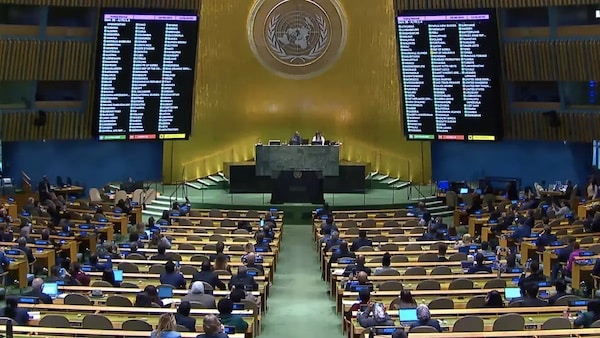On Wednesday, the United Nations General Assembly (UNGA) met to vote on a resolution on the necessity of ending the blockade imposed by the United States against Cuba.
During the meeting, 187 countries voted in favor of lifting the blockade, Israel and the United States voted against, and Moldova abstained from voting.
This marks the thirty-second time that Cuba has introduced this resolution, which continues to gather increasing support against the U.S. economic sanctions package, now in place for 62 years.
The UNGA had asked the United Nations Secretariat to prepare a report by consulting member countries and UN system bodies on this resolution, titled “The Need to End the Economic, Commercial, and Financial Blockade Imposed by the United States of America Against Cuba.”
The final report includes strong responses against the U.S. blockade from over 180 countries and 35 international institutions, including UNICEF, the World Food Programme, the UN Development Programme, and the World Health Organization.
The resolution reaffirms “the sovereign equality of States, non-intervention and non-interference in internal affairs, and the freedom of international trade and navigation.”
https://twitter.com/telesurenglish/status/1851657062100373556?ref_src=twsrc%5Etfw%7Ctwcamp%5Etweetembed%7Ctwterm%5E1851657062100373556%7Ctwgr%5E384ec9663cbc3315d3f683e8b3e780cc7484ebb1%7Ctwcon%5Es1_&ref_url=https%3A%2F%2Fwww.telesurenglish.net%2F187-countries-demand-an-end-to-the-u-s-blockade-against-cuba%2F
Previously, Cuba’s Affairs Ministry indicated that it expects to achieve a result this year similar to that of 2023, when it received 187 favorable votes, only two against (the United States and Israel), and one abstention (Ukraine).
On Tuesday, Russia’s delegation took the floor during the first session of the UNGA debate to describe U.S. policy in Cuba as a relic of the Cold War. “It’s a clear example of neocolonialism on the part of the United States. It affects Cuba and 200 countries that wish to build trade relations with Cuba,” said Vasily Nebenzia, Russia’s representative to the United Nations.
Latin American countries, including Mexico and Venezuela, as well as members of the Group of 77 and China, shared this position. “It is a blockade that represents the most unjust, severe, and prolonged system of unilateral coercive measures against any country in modern history,” stated Venezuela’s delegation, taking a further step in their criticism of the U.S.’s “supremacist mindset.”
Washington imposed its first sanctions in 1959, shortly after the victory of the Cuban revolution, but the first major block of measures came in 1962 under President John F. Kennedy. Since then, these measures have been expanded and intensified multiple times, such as with the Helms-Burton Act (1996) and the 240 measures under the Trump administration (2017-2021). The Biden administration has largely maintained Trump’s policies.
Currently, due to the U.S. blockade, Cuba suffers from shortages of food, medicine, and fuel; prolonged daily blackouts; rampant inflation; increasing dollarization; and a deterioration of public services, including education and healthcare.

